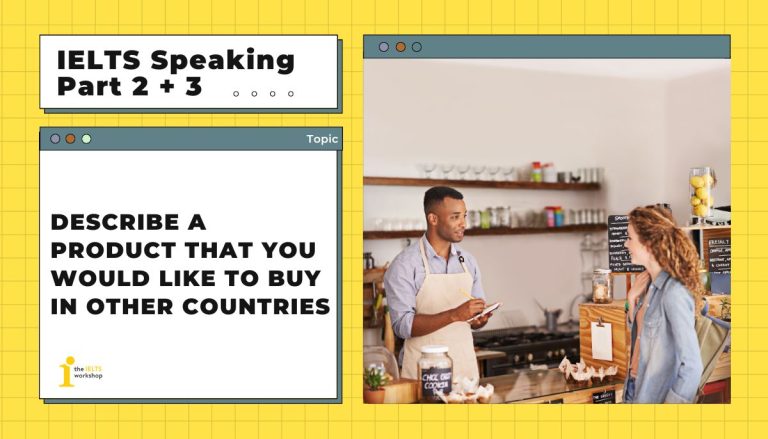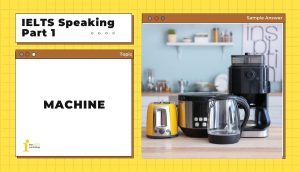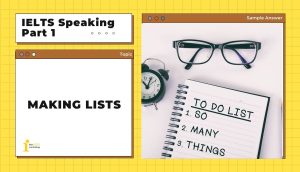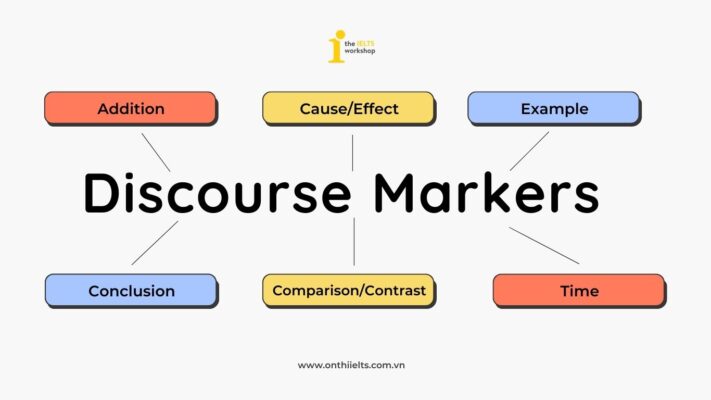Trong bài giải mẫu lần này, cô Phương Duyên và thầy Thành Trung của The IELTS Workshop sẽ hướng dẫn bạn trả lời topic “Describe a product that you would like to buy in other countries“ trong IELTS Speaking Part 2. Cùng tham khảo sample, từ vựng và một vài cách diễn đạt ghi điểm trong phần thi IELTS Speaking nhé.
Part 2: Describe a product that you would like to buy in other countries
Describe a product that you would like to buy in other countries
You should say:
What product it is
When you want to buy it
Whether it has any special feature
And explain why you want to buy it.
Dưới đây là bài mẫu cho topic “Describe a product that you would like to buy in other countries”.
1. Bài mẫu (Sample)
Sample 1:
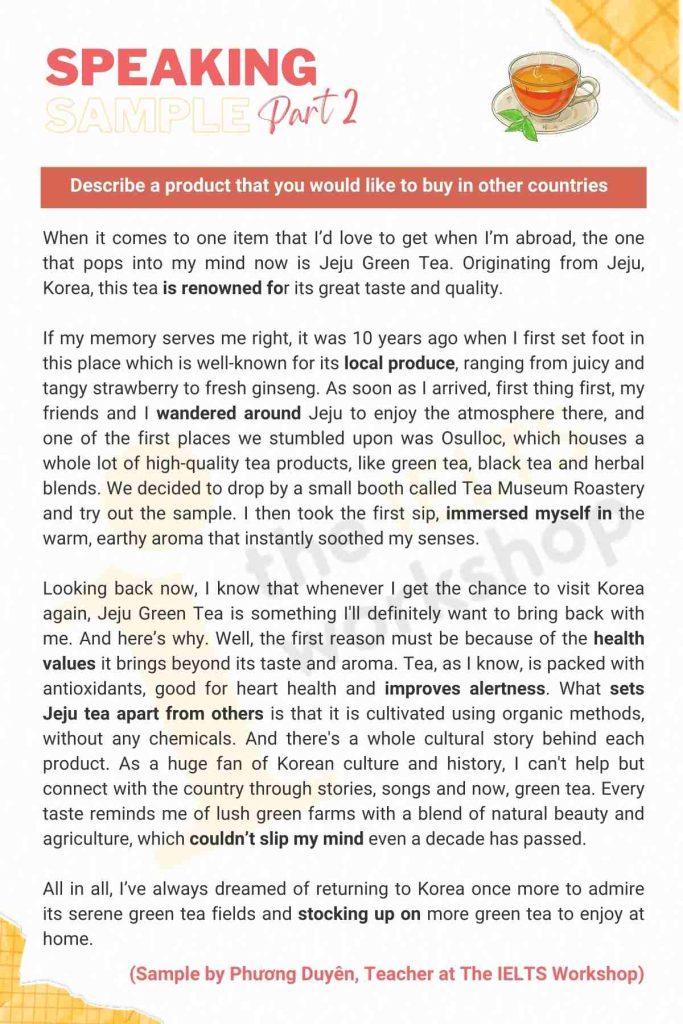
Sample 2:
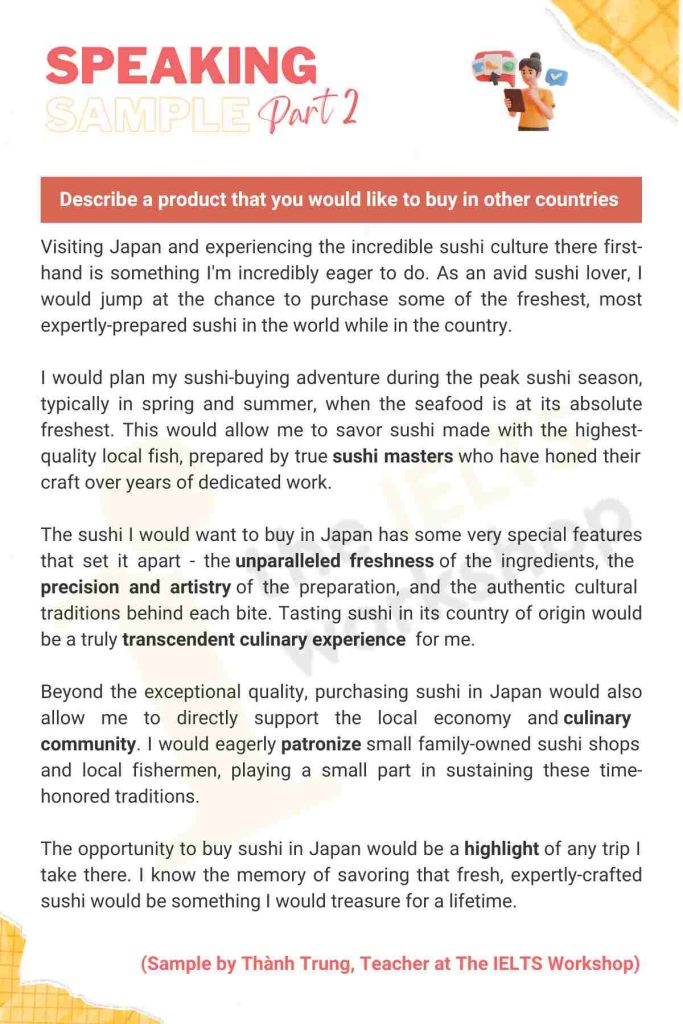
2. Từ vựng (Vocabulary)
Sample 1:
- To be renowned for something: Được biết đến vì điều gì đó
- Local produce: Nông sản địa phương
- To wander around somewhere: Lang thang xung quanh đâu đó.
- To immerse myself in something: Đắm chìm vào cái gì đó.
- Health values: Giá trị sức khỏe.
- To improve alertness: Tăng sự tập trung
- To set something apart from something: Làm nó trở nên khác biệt so với các thứ khác
- Something couldn’t slip my mind: Điều gì đó không thể quên.
- To stock up on something: Tích trữ cái gì đó.
Sample 2:
- sushi masters: bậc thầy làm sushi
- unparalleled freshness: độ tươi ngon không gì sánh được
- precision and artistry: sự tỉ mỉ và nghệ thuật
- transcendent culinary experience: trải nghiệm ẩm thực tuyệt vời
- culinary community: cộng đồng ẩm thực
- patronize: thường xuyên đến ủng hộ
- highlight: điểm nhấn
Part 3:
Bên cạnh Part 2, bạn hãy tham khảo thêm Part 3 cho chủ đề này nhé
What is the product which is consumed most in your country? Why?
Did you tell anyone after buying it?
What are your thoughts about the trend that people buy new things instead of repairing old ones?
Why do people living in different regions like different foods?
1. What is the product which is consumed most in your country? Why?
Sample 1: Well, I’d say electrical devices are most commonly purchased and used in Vietnam. This is simply because these items make our lives a whole lot easier, adding a bit of tech magic to everyday routines.
For instance, smartphones are essential for us to keep in touch with each other no matter where we are. They allow users to stay connected through calls, messages and apps on a daily basis. Another example is that, instead of spending time doing household chores, which is labor-intensive, Vietnamese these days can make use of robot cleaners or dishwashers. This frees up time so they can focus on other things they need to get done every day.
- A whole lot easier: Dễ hơn nhiều
- Stay connected: Giữ liên lạc
- Make use of: Tận dụng
Sample 2: The product most consumed in my country is rice. This is due to the ideal climate and geography for growing rice, its versatility in cooking various dishes, and its widespread affordability and accessibility across all socioeconomic levels in our society.
- Versatility: tính đa dạng
- affordability: khả năng chi trả
- Accessibility: khả năng tiếp cận
- socioeconomic: kinh tế-xã hội
2. Did you tell anyone after buying it?
Sample 1: 100% yes. Because I was so excited about it, I couldn’t wait to tell someone about it and share the experience. I remembered chatting with one of my best friends about it because she was also a huge fan of green tea, and we ended up having a great conversation about the health benefits of green tea and swapping tips on where to find the best teas back in Vietnam. It was nice to bond over something we both enjoy.
- To be a huge fan of something: Người ưa thích cái gì đó
- Swap tips: Trao đổi những tips, mẹo vặt
- Bond over something: Trở nên thân thiết nhờ vào cái gì đó
Sample 2: Yes, I did tell someone about the product I had just purchased. As soon as I made the buy, I was quite excited about it and wanted to share the experience with a close friend who I knew would appreciate and be interested in hearing about my new acquisition. Sharing my consumer experience with this trusted friend allowed me to further enjoy the purchase.
- new acquisition: món đồ mới mua
- consumer experience: trải nghiệm người tiêu dùng
3. What are your thoughts about the trend that people buy new things instead of repairing old ones?
Sample 1: Well, I probably have mixed feelings about it. On the one hand, I guess getting one’s hands on a shiny and fresh product is like a little rush of excitement, isn’t it? Unboxing a gadget or trying out brand new clothes can be pretty satisfying. On top of that, buying new stuff is often a breeze – it saves time and even money. But on the flip side, if someone doesn’t make any efforts to fix things up, it can feel like we’re being a bit wasteful. For example, we may end up chucking out a fan that could probably still be useful just because it just needs oiling to run smoothly. It’s like we’re contributing to our throw-away culture, adding more and more to overflowing landfills.
- To have mixed feelings about something: Có cảm giác lẫn lộn
- A rush of excitement: Cảm giác phấn khích
- To be a breeze: Điều dễ làm, dễ đạt được
- To chuck out something: Bỏ đi cái gì đó
Sample 2: I have mixed feelings about the trend of people increasingly choosing to buy new products instead of repairing old ones. On one hand, I can understand the appeal and convenience of replacement over repair. However, I’m concerned that this “throwaway” mentality is having negative environmental and economic impacts through increased waste and unsustainable consumption. I believe there needs to be a cultural shift back towards greater repair and maintenance of existing products, which would be more cost-effective in the long run. This will require individual consumer choices and systemic changes from manufacturers to make repairs more accessible and affordable.
- “throwaway” mentality: tâm lý thích vứt bỏ đồ đạc a
- Unsustainable: không bền vững
- cultural shift: sự thay đổi về văn hóa
- cost-effective: hiệu quả về chi phí
4. Why do people living in different regions like different foods?
Sample 1: I guess it really boils down to their cultures and what’s available locally.
First off, cultures and rituals decide what foods are eaten and when. For example, holiday feasts in different cultures feature a wide range of delicious dishes, such as banh chung in Vietnam Tet holiday, or tiramisu as a dessert in Italy for Christmas. These recipes have been around for ages, keeping our tastes tied to our roots and becoming our favorites over time. Another thing to consider is what is readily on offer. Like, for someone living in the coastal areas, they have got loads of fresh seafood for all their lives, which might become their top pick for food, like a taste of home. It’s what shapes their cravings and eating habits as they grow up.
- To boil down to: Chung quy là
- Holiday feast: Món ăn vào dịp lễ
- To be on offer: Có sẵn
- Top pick for food: Món ăn ưa thích
Sample 2: People living in different regions tend to develop preferences for distinct regional cuisines and food items due to a variety of factors. These include the local climate, geography, and available ingredients; historical and cultural traditions; socioeconomic conditions; and the introduction of new foods through trade, migration, and cultural exchange over time. The unique combinations of these elements in each region create the rich diversity of global food cultures that we see today.
- regional cuisines: ẩm thực khu vực
- socioeconomic conditions: điều kiện kinh tế-xã hội
- cultural exchange: trao đổi văn hóa
- Diversity: sự đa dạng
Bài mẫu bởi cô Phương Duyên và thầy Thành Trung – Giáo viên The IELTS Workshop
Xem thêm: Bài mẫu IELTS Speaking Part 2 + 3 | Topic: Traditional Products
Các bạn có thể tham khảo Bộ đề dự đoán IELTS Speaking của The IELTS Workshop để ôn tập những chủ đề mới cho kỳ thi IELTS sắp tới của mình nhé!
Nếu bạn muốn nhận Mentor 1-1 để hoàn thiện kĩ năng Speaking của mình trước khi bước vào kỳ thi, tham khảo ngay Khóa bổ trợ từng kỹ năng IELTS của The IELTS Workshop.


